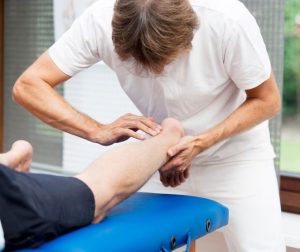The achilles tendon connects the gastrocnemius and soleus (calf muscles) to the calcaneus (heel bone). It is the thickest tendon in the human body and has the capacity to withstand large tensile forces.
The tendon is involved in over 90% of the plantar flexion force (pushing the foot downwards, which is extremely important for propulsion). The anatomy of the tendon provides for both elasticity (recoil) and shock-absorbance in the foot.
It is very important to understand this when you consider a rehabilitation program.

Rehabilitation of an achilles tendinopathy
Rehabilitation of an achilles tendinopathy involves a lot of loading of the tendon.
You should not stretch the tendon as it causes micro tears, even if you feel your achilles and calf feel “tight”.
Initially it is important to rest the tendon and ice.
Stop what has caused the injury, for example if it was caused by repetitive loading like running then you need to stop running and find out why this has happened.
It is important to consult with your physiotherapist at this point for further advice.
After the initial stages of rehabilitation
After the initial stages of rehabilitation and rest you will get back on your feet.
So thinking back at the first paragraph the function, loading and anatomy of the tendon.
When you are rehabilitating it, a lot of people try to run before they can walk. For example when you are running you are springing off one foot onto the other, therefore you need that propulsive force to be coming though one foot.
That means all your body weight, gravity and extra forces are going through one leg. If that tendon is not properly rehabilitated before all this force is going through it, you will cause a re-injury.
Therefore the end stage of rehabilitation is EXTREMELY important to get you back to pre-injury
Remember?
If you feel this applies to you, if you are suffering re-injuries or are not recovering from a long term achilles injury, please feel free to call us on 0214633455 for a free telephone consultation or book an appointment with one of our Chartered Physiotherapists here at East Cork Physiotherapy, Balance & Acupuncture Clinic by clicking the link below.
We hope you enjoyed this blog by Kate O Connor, Chartered Physiotherapist.
This blog is provided for information purposes only. The content is not intended to be a substitute for professional medical advice, diagnosis or treatment. Seek the advice of your doctor with any queries regarding a medical condition.
